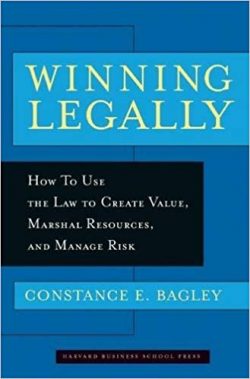
Chosen as one of Business Insider’s twenty-five must-read books for entrepreneurs and coauthored with preeminent venture capital counsel Craig E. Dauchy, examines the stages of starting a business—from leaving one’s current employer and forming the founding team to deciding how to structure and fund the enterprise to marshalling its human resources and protecting its intellectual property to negotiating and entering into contracts and licensing arrangements to prudently managing operational risks to expanding internationally and ultimately growing through acquisitions or a sale of the company or an initial public offering. View Contents in Brief A running hypothetical of a 3-D manufacturing venture brings the legal and strategic concepts to life and offers examples of the types of issues entrepreneurs are likely to face during each phase of development along with concrete advice for avoiding traps for the unwary. Cutting-edge examples show how legally astute entrepreneurs advised by strategically astute counsel can identify and seize opportunities to increase realizable value; marshal, deploy, and redeploy resources; and identify and manage legal and business threats and risks. Chris Dixon of the venture capital firm of Andreesen Horowitz called The Entrepreneur’s Guide “perhaps the most useful business book you can ever read.” In addition to being a popular resource for entrepreneurs and the investors, lawyers, accountants, and other advisors who work with them, The Entrepreneur’s Guide is used widely as a primary text in business schools, law schools, colleges, and universities. [View Adoption List]

Explains how law undergirds the capitalist system and is key to innovation and value creation. It provides a comprehensive and integrated analysis of the laws and legal strategies applicable to the conduct of business in the United States and internationally with close attention to not only what is legal but also what is right. View Contents in Brief Designed to enhance the legal astuteness of its readers, the ninth edition addresses mandatory arbitration, the rights of workers at firms, like Uber, in the “gig” economy, including their status as employees or independent contractors; the ability of employers to restrict employees’ use of social media; application of the Fourth Amendment ban on unreasonable searches and seizures to cell tower location data; the rules governing “crowdfunding” and initial “blockchain” coin offerings; and the ramifications of the EU’s “right to be forgotten” and its other privacy protections. Nobel laureate in economics Robert Shiller called Managers and the Legal Environment “most impressive” and dubbed it an “important reference book.” [View Adoption List]

Shows how managers can proactively harness the power of the law to maximize and capture corporate value; marshal human, intangible, and financial resources; and manage risk. Through scores of classic and contemporary examples across the business landscape, this approachable guide sheds light on the sometimes bewildering laws and regulations applicable to business. Just as Clemenceau explained that war is too important to leave to the generals, Bagley explains that legal matters are too important to leave to the lawyers. Managers learn how to select and work effectively with legal advisers and to spot legal issues before they become problems. Equally importantly, readers get practice exercising informed judgment and become more adept applying the appropriate legal tools so their legal strategy is fully integrated with their market strategy. As legendary venture capitalist Arthur Rock, whose early investments included Intel and Apple, put it: “This timely book is required reading for every business manager and general counsel. Professor Bagley has provided a practical guide to harnessing corporate legal resources with sound business judgment to maximize shareholder value.” [View Endorsements]